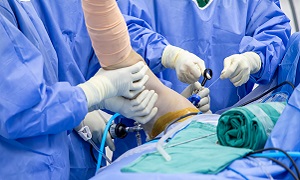Dislocated Shoulder
Dislocated shoulder is an injury in which the upper arm bone pops out of the cup-shaped socket which is a part of your shoulder blade. Your shoulder is the most mobile joint in the body, and it allows the arm to move in multiple directions. Due to this ability to move, the shoulder is not only unstable but also the most dislocated joint in the body.
Shoulder dislocations occur when the head of the humerus is removed forcibly from the socket in the glenoid fossa. The shoulder can get dislocated in several different directions, and a dislocated shoulder is described by the location, where the humeral head ends up after it gets dislocated.
Dislocations in younger people generally arise from trauma, which is usually associated with sports such as football or basketball. When it comes to older people, they are prone to dislocations due to the gradual weakening of the ligaments and cartilage that supports the shoulder. Even in such cases, some force needs to be applied to the shoulder joint to make it dislocated.
If you suspect a dislocated shoulder, it is important to seek prompt medical attention.
Symptoms
A dislocated shoulder generally shows the following signs and symptoms:
- A visibly deformed or out-of-place shoulder
- Intense pain
- Inability to move the joint
- Swelling
- Bruising
Sometimes, the dislocation might also cause numbness, weakness, or tingling near the injury, such as in your neck or down your arm.
If you suspect a shoulder dislocation, see a doctor right away. While you are waiting for medical attention, please note the following points:
Don’t move the joint – Splint or sling the shoulder joint in its current position and remember not to try to move the shoulder or force it back into its place. This can cause damage to the shoulder joint as well as its surrounding muscles, ligaments, nerves, or blood vessels.
Ice the injured joint – You can choose to apply ice to your shoulder as this can help you to reduce pain and swelling as it controls any internal bleeding and the buildup of fluids in and around your shoulder joint.
Causes & risk factors
The shoulder joint is known to be the most frequently dislocated joint in the human body and since it moves in several directions, your shoulder can get dislocated downward, forward, backward, completely, or partially. However, most dislocations are known to occur through the front of the shoulder.
A strong force, such as a sudden blow to your shoulder, is required, to pull the bones out of their place. In some cases, extreme rotation of your shoulder joint can also pop the ball of your upper arm bone out of your shoulder socket.
In most cases, a dislocated shoulder is caused by sports injuries. A hard blow to your shoulder during a motor vehicle accident is also a common cause. You may also dislocate your shoulder during a fall, such as from a ladder.
Diagnosis
When a patient shows signs of a shoulder dislocation; pain control, and joint relocation are the primary considerations. However, at the same time, your doctor needs to understand the mechanism of injury and the circumstances surrounding it. It is important to know if this is the first shoulder dislocation or whether the joint has suffered injury previously. In addition, your doctor might ask a few questions about medications, allergies, the time of the last meal, as well as your past medical history.
Physical examination of the shoulder will be required, and it will begin with an inspection. Plain X-rays are also most likely going to be required, to confirm the diagnosis of shoulder dislocation, and to make certain there are no broken bones associated with this dislocation.
Treatment
If your shoulder dislocation is simple, without any major nerve or tissue damage, then the shoulder joint is likely going to improve over a few weeks. It is best not to resume activity too soon after your shoulder dislocation, as it might cause not only cause injury to your shoulder joint, but it may cause it to dislocate again.
If your shoulder dislocation is serious, the following treatments may follow:
Closed reduction
Your doctor is going to try certain gentle maneuvers which should likely help your shoulder bones get back into their correct position. Depending on the amount of pain and swelling, you may also require a muscle relaxant or sedative or, in rare cases, a general anesthetic before manipulation of your shoulder bones. When your shoulder bones are back in their place, the pain should go almost immediately.
Medication
Surgery
Immobilization
A special splint or sling might be used for some days to keep your shoulder from moving. How long you will need to wear the splint or sling will depend on the nature of your shoulder dislocation and how soon the splint is applied after your dislocation.
Rehabilitation
After your shoulder splint or sling is removed, you’ll need to start a gradual rehabilitation program which is designed to restore range of motion, as well as strength and stability to your shoulder joint.



